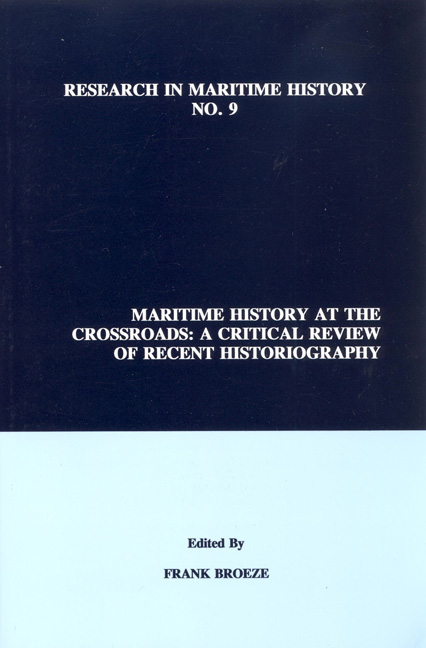Book contents
Introduction
Summary
The purpose of this volume is to contribute to a critical review of the current state of maritime historiography. As such, it will add to and complement the growing number of similar studies published in recent years. Indeed, in view of the effort devoted to this collective soul searching and stock taking, one might well say that the genre has itself become an historiographical phenomenon of particular importance, thus marking an important stage in the development of maritime history.
The origins of this collection of essays rest in the “New Directions in Maritime History” conference, held at Fremantle, Western Australia, in December 1993. In addition to a number of specific sessions, which generated many papers that have found their way into the professional literature, the conference also aimed at discussing the state of maritime history. Several of the papers then delivered form the nucleus of the present volume. The other chapters were added by invitation. Although general guidelines were distributed to the prospective authors and one of the original Fremantle papers was specifically suggested as a model, it was also recognized that the particular circumstances of each country's historiography and the individual insights and priorities of each author might allow for some variations in organization and presentation. It is hoped that this somewhat pragmatic approach has resulted in an array of essays that is at the same time effectively country-specific and homogeneous in purpose and perspective.
Since it would be patently impossible to cover all countries within the covers of a single book, this volume is restricted in its geographical and thematic scope. Accepting the reality that no historiographical overview can ever be complete, we offer here a combination of, on the one hand, relatively unknown countries and, on the other, some of the group that used to be called - rather misleadingly - in northwestern Europe the “traditional“ maritime nations. “Tradition” is, of course, a relative and in this case essentially eurocentric concept, and it will immediately be seen that many countries outside that formerly sacred circle can point to maritime activities dating back at least as far as (or even further than) those of Britain, the Netherlands and Scandinavia.
- Type
- Chapter
- Information
- Maritime History at the CrossroadsA Critical Review of Recent Historiography, pp. ix - xxiiPublisher: Liverpool University PressPrint publication year: 1995



